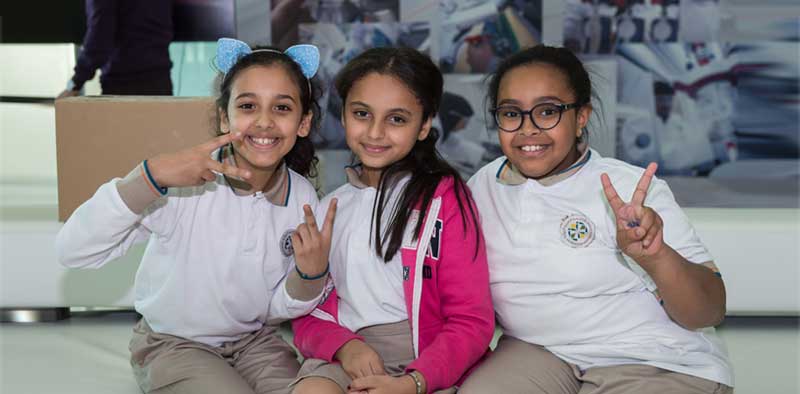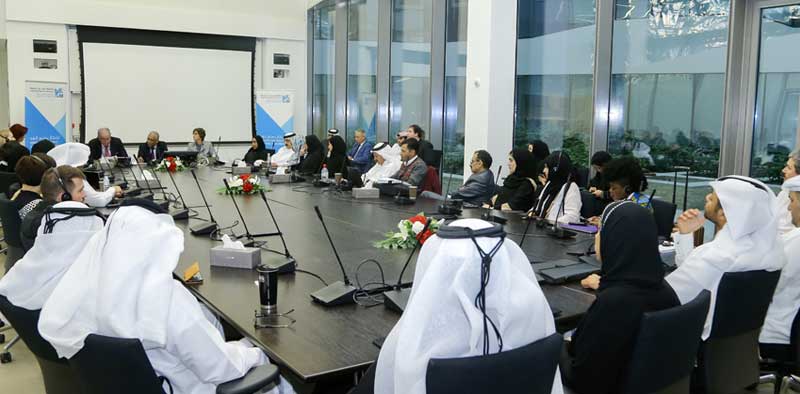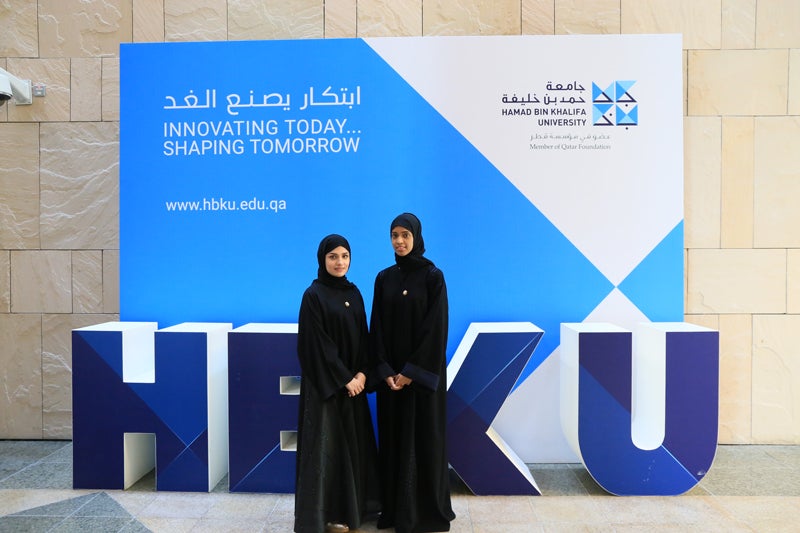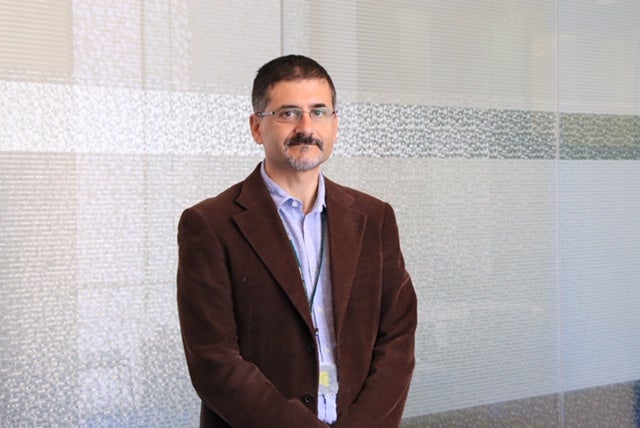
أطلق معهد قطر لبحوث البيئة والطاقة، التابع لجامعة حمد بن خليفة، برنامجه التوعوي الطلابي لعام 2019 باستقبال وفدٍ زائرٍ من طلاب الأكاديمية العربية الدولية. ويتماشى البرنامج مع رسالة المعهد الرامية لتعزيز الاهتمام بالعلوم والبحوث لدى أجيال المستقبل، وتوعيتهم بقضايا أمن الطاقة، والمياه، والاستدامة، والتكنولوجيا، والبيئة في قطر.
وقام الطلاب الزائرون، البالغ عددهم 42 فردًا، بجولة في المحطات الأربع التابعة للمعهد التي تتعامل مع التحديات الكبرى التي تواجه دولة قطر، بالإضافة إلى المرافق والمختبرات الرئيسية التابعة للمعهد.

Qatar Environment and Energy Research Institute (QEERI), part of Hamad Bin Khalifa University (HBKU), has launched its 2019 Student Outreach Program with a visit from students of Arab International Academy. The program is in line with QEERI’s mission to inspire an interest in science and research among the nation’s younger generation, and to educate them about energy, technology, water security, environment and sustainability in Qatar.

استضافت كلية القانون والسياسة العامة بجامعة حمد بن خليفة، مؤخرًا، الدكتور خوسيه راؤول توريس كيرمسر، وزير ورئيس المحكمة العليا بجمهورية باراغواي. ويشغل الدكتور كيرمسر كذلك منصبيّ رئيس مجلس القضاء الأعلى، ورئيس الغرفة المدنية بالمحكمة العليا في باراغواي. وتناول الدكتور كيرمسر، خلال محاضرة ألقاها أمام أعضاء هيئة التدريس، والطلاب، والضيوف المدعوين، دور المحكمة العليا في باراغواي واختصاصها القضائي. كما أجاب عن الأسئلة المتعلقة بالاستقلال القضائي وحقوق السكان الأصليين.

The College of Law and Public Policy (CLPP) at Hamad Bin Khalifa University (HBKU) recently hosted The Right Honorable Dr. José Raúl Torres Kirmser, Minister-President of the Supreme Court of Justice of the Republic of Paraguay. President Kirmser also holds the positions of President of the Judicial Supreme Council and President of the Civil Chamber at the Supreme Court of Paraguay. In a lecture before faculty, students, and invited guests, President Kirmser discussed the role of the Supreme Court of Paraguay and its jurisdiction.

بعد أقل من عقدٍ على تأسيسها، مبتكرون شباب بالجامعة يحققون قفزات ملموسة في الطب الحيوي
إذا ما حاولت البحث عن دلال أو منيرة، فمن الوارد أن تجدهما منهمكتين في العمل بالقرب من إحدى المعدات، أو في تقديم الاستشارة لأحد المرضى في المستشفى، أو في تشغيل أجهزة يصل وزنها وحجمها إلى ضعف أحجامهن تقريبًا بكل سلاسة ويسر.
Less than a decade since its founding, the University’s young innovators are making strides in biomedicine.

If you were to ever search for Dalal or Munira, you are likely to find them tinkering with bedside equipment, counseling a hospital patient, or seamlessly operating devices nearly twice their weight and size.
This is a day in the life of both students, who are currently enrolled in the College of Health and Life Sciences’ (CHLS) newest academic program in genomics and precision medicine. Dalal and Munira’s time is evenly split between the classroom and state-of-the-art facilities that are housed by their employers.

وقَّعت كلية العلوم الصحية والحيوية بجامعة حمد بن خليفة، مؤخرًا، مذكرة تفاهم مع المركز الطبي البيطري للخيل، يتعاون بموجبها الطرفان في مجالات البحوث والدراسات العليا.
وقَّع المذكرة الدكتور إدوارد ستونكيل، العميد المؤسِّس لكلية العلوم الصحية والحيوية، والدكتورة جيسيكا جونسون، مدير المركز الطبي البيطري للخيل بالإنابة. وتهدف الاتفاقية إلى توسيع نطاق التعاون المثمر، وبحوث العلوم الصحية والحياتية، وتعزيز الخبرات البحثية في مجال الطب الحيوي، وتطوير الكفاءات البيطرية.

The College of Health and Life Sciences (CHLS) at Hamad Bin Khalifa University (HBKU) has signed a Memorandum of Understanding (MoU) with Equine Veterinary Medical Center (EVMC), which will see the two entities collaborate in areas of research and graduate education.
Dr. Edward Stuenkel, founding dean of CHLS, and Dr. Jessica Johnson, acting director of EVMC, signed the MoU. The agreement aims to extend the productive interactions and research of health and life sciences, enhance biomedical research expertise and expand veterinary competencies.

حصلت كلية العلوم والهندسة بجامعة حمد بن خليفة على تمويل كبير لمساعدتها في وضع تصور جديد لاستخدام تكنولوجيا سلسلة البيانات في الأنظمة الأمنية.
وخلال السنوات الأخيرة، تسبب طرح تكنولوجيا سلاسل البيانات في حدوث طفرة بجميع أنواع الصناعات المهنية. ولكن أعضاء هيئة التدريس بكلية العلوم والهندسة، في جامعة حمد بن خليفة، يأملون الآن في تجاوز الحدود، وإعادة صياغة استخداماتها في العصر الحالي من خلال تقديم تحليلات احتمالية.

HBKU’s College of Science and Engineering has been awarded significant funding to reimagine the use of blockchain technologies in security systems.
In recent years, the introduction of blockchain has caused a buzz in all kinds of industries. But faculty members at HBKU’s College of Science and Engineering (CSE) are now hoping to cross boundaries and reshape its modern-day uses through the introduction of probabilistic analyses.